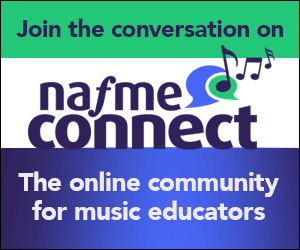NAfME BLOG
Federal Budget Update: What Proposed FY 2026 Education Cuts Mean for the Arts

/ News Posts / Federal Budget Update: What Proposed FY 2026 Education Cuts Mean for the Arts
Federal Budget Update
What Proposed FY 2026 Education Cuts Mean for the Arts
By Amber Friel, NAfME Communications Manager, Advocacy and Public Policy
As the federal government winds down Fiscal Year 2025 and is faced with a potential shutdown, competing budget conversations around education funding for FY 2026 continue. Separate proposals from the Trump administration, the House, and the Senate reflect significantly different visions for the future of public education and the federal government’s role in supporting a well-rounded curriculum in our nation’s schools.
In May, President Trump released his administration’s FY 2026 budget proposal, calling for a $12 billion, or 15.3%, cut to the U.S. Department of Education. His plan reflects a broader effort to reduce federal investment in K–12 education, with the proposed consolidation of several key education programs.
The House of Representatives followed suit with its own Labor-HHS-Education bill, marked up on September 9. The House plan includes similarly deep cuts of more than $12 billion in reductions to the Department of Education. Title I, which supports schools with high numbers of low-income students, would face a 27% funding cut. While the House proposal stops short of implementing the president’s push for a massive K–12 block grant or restructuring Title I and the Individuals with Disabilities Education Act (IDEA), it does include provisions that would block funding for diversity, equity, and inclusion efforts, as well as initiatives related to critical race theory.
Crucially, the House bill also proposes eliminating funding for the Assistance for Arts Education (AAE) program entirely. Framed as a move to prioritize “core” academic subjects like reading, writing, and math, this cut would further limit access to music and arts education and stifle efforts to provide students with a truly well-rounded education.
The potential impact of these proposals is already being felt. Of the approximately 22 grantees awarded five-year AAE grants in 2021, at least nine have recently received non-continuation notices, as the Trump administration cancels multiple federal education grants. The loss of AAE funding could severely impact students’ access to arts education opportunities across the country.
Meanwhile, the Senate has taken a markedly different approach. In late July, the Senate Appropriations Committee approved its FY 2026 Labor-HHS-Education bill, which rejects many of the Trump administration’s proposed cuts. The Senate plan would allocate $79 billion to the Department of Education: an amount that includes $50 million increases to both Title I and the IDEA, signaling continued support for federal investment in public education.
Here’s a snapshot of how key federal education programs are faring across the different budget proposals:
| Program Title | FY 2025 Funding | FY 2026 Trump Budget Proposal | FY 2026 Senate Committee Bill | FY 2026 House Committee Bill |
| Title I | $18.41 B | $18.4 B | $18.5 B | $14.6 B |
| IDEA | $14.213 B | $14.213 B | $14.263 B | $14.289 B |
| Title IV-A | $1.380 B | $0 | $1.380 B | $1.385 B |
| 21st Century Community Learning Centers | $1.33 B | $0 | $1.33 B | $1.33 B |
| Title II | $2.19 B | $0 | $2.19 B | $0 |
| Assistance for Arts Education | $36.5 M | $0 | $31.5 M | $0 |
In response to this shifting landscape, Rep. Sydney Kamlager-Dove (CA-37) reintroduced the Equitable Arts Education Enhancement Act (H.R. 5399) on September 16, alongside Reps. Nydia Velázquez (NY-7), Cleo Fields (LA-6), Suzanne Bonamici (OR-1), Eleanor Holmes Norton (DC-At Large), and Shri Thanedar (MI-13). The act seeks to expand access to arts education by providing targeted funding for students at Minority-Serving Institutions—particularly urgent as $2 million in AAE funding is being redirected to charter schools.
Since May, NAfME and the Arts Education Alliance have been actively urging Congress to preserve and increase funding for programs that support a well-rounded education—including access to dance, media arts, music, theatre, and visual arts. No matter how the final FY 2026 budget takes shape, we remain dedicated to ensuring students have equitable access to high-quality arts education programs.
That commitment is echoed by more than 2,500 individuals who have already contacted their members of Congress to speak out in support of these vital opportunities. With their continued engagement, and yours, we’ll keep pushing to ensure music and the arts remain a core part of every student’s education nationwide.
Published Date
September 30, 2025
Category
- Advocacy
- Advocacy
- Federal Advocacy & Public Policy
Copyright
September 30, 2025. © National Association for Music Education (NAfME.org)



